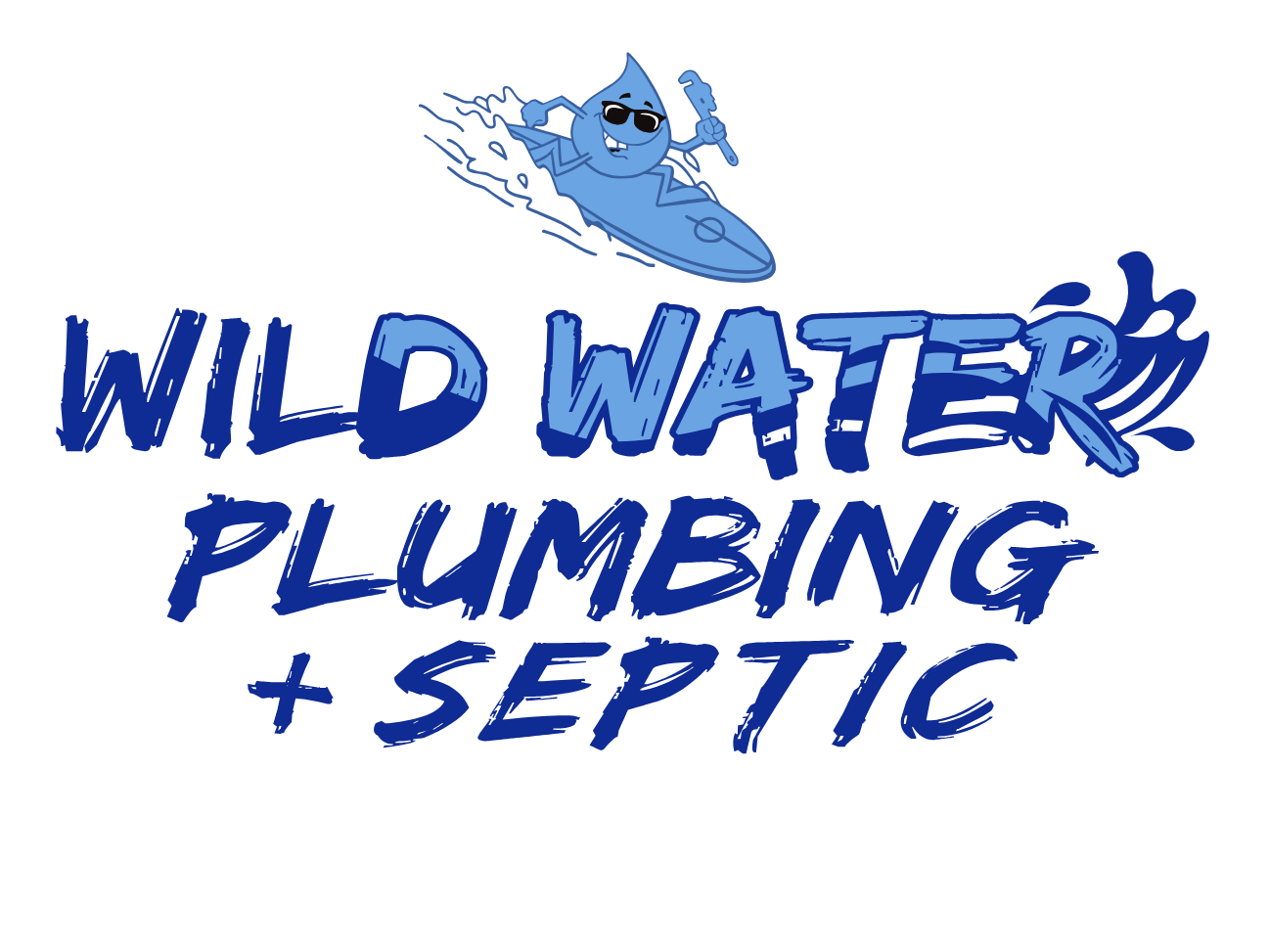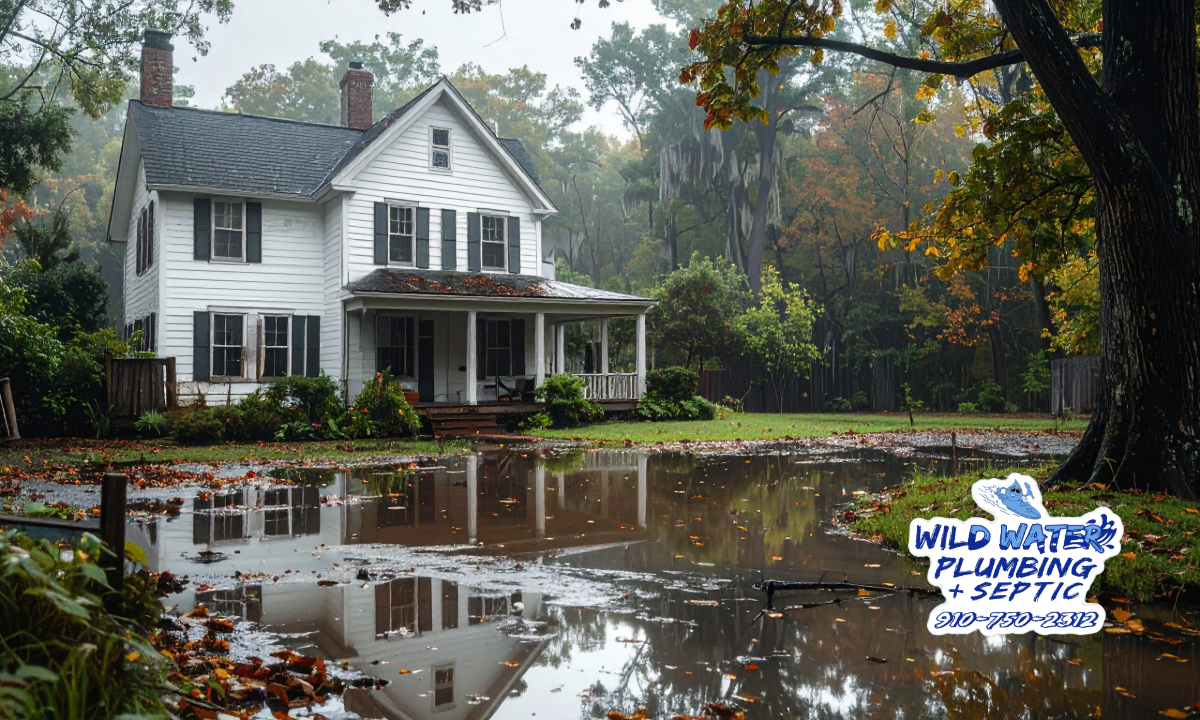By Justin Wilder, Owner of Wild Water Plumbing + Septic | French Drains | Septic Systems
Bottom Life Up Front
Standing water in your yard is not just annoying; it’s dangerous. In Onslow, Pender, Carteret, New Hanover, and Duplin Counties, it is actively destroying septic drain fields, weakening home foundations, and creating long-term property damage. A professionally installed French drain is one of the most effective ways to protect your septic system, redirect dangerous groundwater, and prevent yard flooding before it becomes a catastrophic, expensive problem.
Introduction: From Soggy Yard to Secure Home
Hey, this is Justin with Wild Water Plumbing + Septic.
If you live in Onslow, Pender, Carteret, New Hanover, or Duplin County, you already know that water has a mind of its own around here.
One good coastal storm can turn a nice yard into a shallow pond. In some neighborhoods, it feels like the ground never really dries out at all.
Puddles, mud, and an unusable lawn are annoying.
But the real danger is what you cannot see.
Standing water and slow-draining soil are quietly attacking your septic system and your foundation from the outside.
By the time you see real damage, the repair bill is usually big.
In this guide, I want to walk you through, in plain language
- Why yards flood so easily in towns across these five counties
- How that water slowly destroys septic systems and foundations
- What a French drain actually is and how it works
- Why proper installation matters, especially around septic systems
- What makes different areas like Jacksonville, Hampstead, Wilmington, Swansboro, and Beulaville especially vulnerable
My goal is simple. I want you to understand what the water is doing on your property so you can stop it before it destroys something expensive.
The Real Cost of a Flooded Yard
When rain falls in Eastern North Carolina, it does not always soak in and disappear as people expect.
The ground reaches its limit very quickly in many of our neighborhoods.
In Onslow County, places like Jacksonville, Richlands, Swansboro, Hubert, Sneads Ferry, and Holly Ridge deal with a mix of clay pockets, compacted fill dirt, and a high water table. Water comes down fast and the soil cannot keep up.
In Pender County, towns such as Hampstead, Surf City, Burgaw, and Rocky Point get hit by coastal storms and stormwater that has nowhere to go except across yards and toward low spots.
Carteret County towns like Morehead City, Beaufort, Newport, and Cape Carteret are surrounded by tidal creeks and sounds.
When you mix heavy rain with high tides, the ground often holds more water than it was ever meant to.
In New Hanover County, areas around Wilmington, Carolina Beach, Wrightsville Beach, Porters Neck, and Murrayville see intense downpours, hard surfaces, and neighborhoods built in what used to be wetlands.
Duplin County communities like Beulaville, Wallace, and Kenansville see slower drainage and heavy soils that stay wet long after the rain stops.
All of this shows up in your yard as
- Pooling water near foundation walls
- Swampy, mushy grass that never really firms up
- Soggy areas over the septic tank or drain field
- Slow or gurgling drains inside the house after storms
- Musty or mildew smells in the crawl space
- Soil washing away and bare spots in the yard
- Mosquito swarms wherever the water lingers
Most people see those symptoms and think, That is just how the yard is.
The truth is different. The yard is telling you something important. Your property cannot move water fast enough, and the water is starting to attack the parts of the home that matter most.
How Standing Water Silently Destroys Your Septic System
Your septic system relies on the drain field. The drain field is not just a place where water disappears.
It is a living filter that needs air in the soil to work. Microbes in that soil need oxygen to break down what comes out of the tank.
When the soil fills up with rainwater, that oxygen disappears.
Here is what happens when the drain field suffocates
- Wastewater stops moving downward
The soil is already full of rainwater, so the septic effluent has nowhere to go. It stays near the surface or rises up through the grass. - Solids start moving where they do not belong
The system is under more pressure. Solids that should stay in the tank get pushed toward the field, clogging the pipes and the soil. - The life of the drain field is cut short
A drain field that should last many years can be ruined in a much shorter time when it stays flooded season after season. - Drains and toilets inside your home begin to complain
You start hearing gurgling sounds. Toilets do not flush as strongly after storms. Sinks and tubs drain slower whenever the ground is wet. - Total system failure becomes more likely
If nothing changes, the field clogs, the system backs up, and you are looking at major work and a big bill to restore basic function.
I see this pattern over and over in neighborhoods across these counties.
In Jacksonville and Richlands, yards that sit a little low will hold stormwater right over the drain field.
In Surf City and North Topsail Beach, homes near marshes have almost no room for water to drain during heavy rain and high tides.
In Morehead City, Cape Carteret, and Beaufort, fields can stay saturated from both above and below when groundwater and surface water meet.
In Wilmington and Carolina Beach, heavy development and fill dirt often mean water that used to spread out now funnels toward certain properties.
In Beulaville and other parts of Duplin County, heavier soils hold water like a sponge, so the drain field never gets the oxygen break it needs.
That is the reality. The good news is that there is a proven way to give the water somewhere else to go.
What a French Drain Is and How It Protects Your Home
A French drain is one of the most straightforward and most powerful tools for controlling water on a property. It is not fancy, but it works.
A French drain is
- A trench dug along a planned path where water likes to collect or flow
- A perforated pipe placed in the bottom of that trench
- Clean gravel surrounding the pipe to let water move freely
- Filter fabric to keep soil and silt from clogging the system
- Backfill and grass on top so the drain disappears into the yard
Think of it as a hidden path that invites water in, gathers it, and carries it away.
For homeowners in Onslow, Pender, Carteret, New Hanover, and Duplin Counties, a properly designed French drain
- Stops yard flooding in the worst trouble spots
- Keeps water away from foundation walls and crawl spaces
- Protects the septic tank and drain field from oversaturation
- Reduces soil compaction so grass and landscaping can breathe
- Extends the usable life of the septic system
- Lets you use more of your yard without stepping into ankle-deep mud
In a low area of Swansboro, that might mean routing water away from a corner of the yard that always floods toward a natural drainage path or ditch.
In Hampstead or Rocky Point, it might mean catching water before it reaches the drain field and pulling it toward a safe discharge point at a lower elevation.
In Beaufort or Newport, it might mean installed drains between the house and a low stretch of yard where both rain and tidal water like to meet.
In Wilmington, Ogden, or Porters Neck, it might mean installing French drains along the back of a lot to divert water from neighboring properties that runs off and heads straight for your septic area.
The concept is not complicated.
The difference between success and failure is all in the design and installation.
Why Proper Installation Is Nonnegotiable
I get called out all the time to look at French drains that do not work.
Most of the time, the idea was good, the effort was real, but the details were wrong.
Here are the most common problems I see
- The pipe is almost flat, so water just sits inside instead of flowing away
- The trench is not deep enough to catch the real flow of groundwater
- The wrong gravel is used, so it packs tight instead of letting water pass
- No filter fabric, so soil fills the gravel and clogs the pipe
- The outlet sends water to another low spot that already floods
- The drain is installed too close to the drain field and starts pulling effluent instead of just groundwater
In coastal and rural parts of these five counties, you also have to pay attention to
- High water tables near sounds, rivers, and creeks
- County setback rules for septic systems
- Utility lines, irrigation, and existing drainage structures
- How neighboring lots handle water
A professional French drain installation around a septic system should always include
- A full yard and water pathway evaluation
I walk the property, look at how water moves now, and listen to when and where you see the worst flooding. - Exact location of all septic components
I locate the tank, distribution box, drain field lines, and any pump or grinder systems to ensure they are protected. - Soil and elevation checks
I look at the soil type, how quickly it absorbs water, and the yard’s natural high and low points. - A trench plan that uses gravity to your advantage
I set the pipe’s slope with levels, so water has a constant, gentle downhill path. - Proper excavation and pipe placement
The trench is dug to the correct depth, the pipe is placed in the correct orientation, and the gravel is added in the proper amount. - Filter fabric and backfill
Fabric keeps soil out of the gravel, and the yard is restored so the drain disappears from view. - Final testing in wet conditions
When possible, I check the system during or after a rain to confirm that the water is actually following the new path.
This is not just about good construction. Around septic systems, it is about protecting a critical part of the property that you rely on every single day.
Unique Drainage Challenges Around Our Counties
Let me break down, county by county, why French drains are often essential in our area.
Onslow County
In Jacksonville, many neighborhoods were built with fill dirt over natural low areas. Water that used to spread across woods and fields now collects in backyards and side yards. Septic systems in older parts of town often sit in the lowest parts of the lot, which means they see more water than they should.
In Richlands and Hubert, heavy rains can turn flat yards into sponges. I often see drain fields in these areas that stay wetter than the rest of the property, simply because the water has no exit path.
In Swansboro, Sneads Ferry, and North Topsail Beach, the mix of sandy soil and high water table means the ground may drain quickly in some spots and hold water in others. French drains help move that trapped water away from tanks and fields that are already dealing with groundwater pressure from below.
Pender County
Hampstead and Surf City are beautiful, but they are loaded with drainage challenges. Many properties sit between the Intracoastal Waterway and elevated roads. Every heavy rain sends water racing across yards and toward low-lying septic areas. French drains are often the only way to keep those yards usable and those systems breathing.
In Burgaw and Rocky Point, lower elevations and slow-draining soils keep yards wet for long periods. When the drain field sits in the middle of that, a French drain is critical to pull water away and give the soil some oxygen space.
Carteret County
In Morehead City, Newport, Beaufort, and Cape Carteret, homeowners fight both stormwater and tidal influences. When a big rain lines up with high tide, yards can act like bowls that fill from both directions. A French drain designed with elevation and outlet location in mind can guide water toward ditches, swales, or other legal discharge areas without drowning the septic field.
New Hanover County
In Wilmington, Carolina Beach, Wrightsville Beach, Porters Neck, and surrounding communities, development has added many concrete surfaces, roofs, and driveways. All that water has to go somewhere. Often it ends up racing through side yards and over septic fields that were never meant to handle that much flow.
French drains can intercept and redirect this runoff before it reaches sensitive areas. When combined with grading and gutter work, they form a complete defense system for both the foundation and the septic system.
Duplin County
In places like Beulaville, Wallace, Kenansville, and the surrounding rural areas, you see more traditional farm and country soils. Some of these are heavy and hold water after storms. Others are compacted from years of vehicle traffic and livestock.
Septic drain fields here often sit in low parts of the yard. When the soil is already heavy and saturated, these fields never truly dry out. Adding French drains along the upslope side of the field can divert a huge amount of stormwater and protect the system from constant overload.
Conclusion: A Smart Investment in the Life of Your Home
A French drain is not just a fancy trench. In our part of North Carolina, it is a lifeline for septic systems and foundations that are under constant attack from water.
When you install a French drain the right way, you are
- Protecting your drain field from suffocating under constant saturation
- Giving your septic system the breathing room it needs to last
- Keeping water away from your foundation and crawl space
- Turning unusable swampy yard back into safe, dry, usable ground
- Reducing the chance of nasty septic backups inside your home
If you live in Onslow, Pender, Carteret, New Hanover, or Duplin County and your yard keeps telling you there is a water problem, listen to it.
When you are ready, call Wild Water Plumbing + Septic at 910 750 2312.
I will walk your property, map out your septic system, study how the water is moving, and give you a clear, honest plan for French drains or other drainage improvements.
You do not have to accept a flooded yard or a constantly stressed septic system as normal.
With the right design and installation, you can take control of the water and protect your home for the long term.
Stay safe and prepared, Jacksonville.
– Justin Wilder, Owner
📞 Call or text me directly at (910) 750-2312 to schedule your storm check today.
Wild Water Plumbing + Septic —Local, Veteran-Owned, and Always Ready.
—


